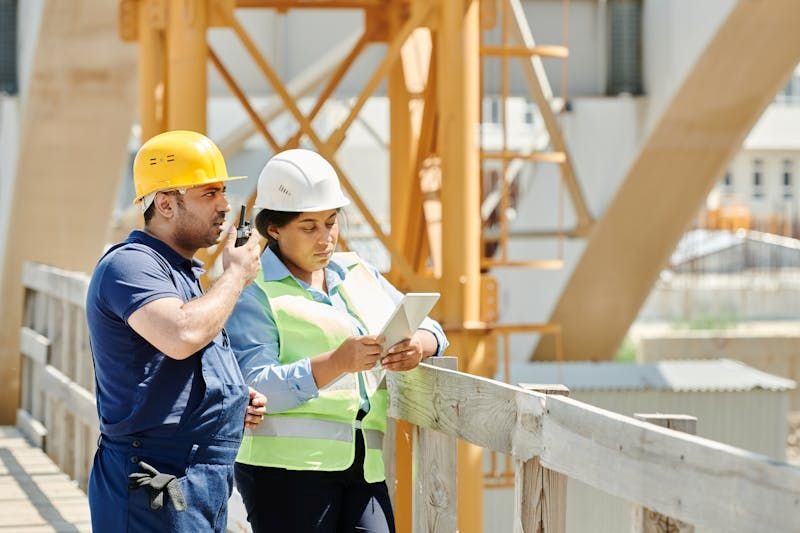
The construction sector in 2026 is undergoing a major transformation, powered by smart infrastructure, green mandates, and digital integration. At the heart of this shift lies the Construction Project Engineer a professional who blends technical expertise with practical project execution.
As per recent global employment data:
- In the United States, over 22,000 new project engineering roles are projected to be created between 2018 and 2028, with a 7% job growth rate.
- In India, the construction sector is expected to grow by 11.2% annually, reaching INR 25.31 trillion in 2026.
- The Middle East construction market is projected to grow from $337.43 billion in 2026 to $361.60 billion in 2026, with further expansion to $401.17 billion by 2030
Salaries have also risen globally, reflecting the expanding scope of construction project engineer duties and responsibilities. If you’re looking to understand how to become a project engineer in construction, this blog will walk you through every essential detail.
Who is a Construction Project Engineer?

A Construction Project Engineer is a professional who guarantees that a building plan is manifested on the ground. They bring design blueprints to life and react to site resources, monitor the progress, correct on-site problems, and ensure that all of this meets safety and legal regulations.
It might be a high-rise residential, an office tower, or a highway bridge, big or small; the engineers on the project to completion are those working out the project, maintaining the stakeholders, controlling the budgets, and operating the site.
Key Responsibilities
Here are the typical daily tasks of a project engineer in construction:
- Coordinate activities between architects, consultants, clients and contractors
- Procurement and construction materials management
- Carrying out of-site safety and quality control monitoring
- Considering and revisiting the timelines of the project
- By scheduling with the help of such tools as MS Project or Primavera
- Pre-production: identifying and solving technical or design-related problems
- Securing the local codes and building regulations
- Writing progress reports and backing documents
These duties of a construction project engineer require a hybrid of technical and managerial skills.
How to Become a Construction Project Engineer? Education & Key Skills

If you’re mapping your journey, here are the essential steps to become a construction project engineer:
Qualification
- A Bachelor’s degree in Civil Engineering, Structural Engineering, or Construction Management
- Postgraduate programs or MBAs in Construction or Infrastructure Management (optional but beneficial)
- Certifications such as PMP (Project Management Professional), AutoCAD, Primavera P6, or Revit
- Courses in BIM, Lean Construction, or Green Building Standards (e.g., IGBC, LEED)
These credentials will help you unlock both entry-level construction project engineer salary and long-term growth potential.
Technical Skills
The top skills for construction project engineers in 2026 include:
- Software: AutoCAD, Revit, Navisworks, Civil 3D, MS Project, Primavera
- Digital projects point to management ability in BIM
- Budgeting, BOQ management and cost estimation
- Site execution knowledge of formwork, concreting, reinforcement
- Regulatory codes are codes, IRC, NBC (India), IBC (USA)
- Test formatting and assessment of risks and compliance monitoring
- The auditing of sites and the safety standard implementation
- Contracting and negotiation with vendors
Soft Skills
Soft skills elevate your ability to lead projects:
- Good communication with the clients and stakeholders
- Leadership of the teams and coordination
- Pressure management, Time management
- Analytical problem-solving
- On-site conflict resolution
- Presentation skills, reporting skills
- The flexibility of high-paced settings
Construction Project Engineer Salary Around The World

Here’s how compensation compares globally for this role:
|
Region |
Salary Range |
Source |
|
India |
₹2 – ₹7 Lakh PA |
Glassdoor |
|
USA |
Glassdoor |
|
Middle East (United Arab Emirates) |
AED 16,000 – AED 18,000 per month |
Glassdoor |
If you’re handling large-scale infrastructure or commercial projects, your commercial construction project engineer salary could be significantly higher. Similarly, professionals with 10+ years of experience fall in the senior project engineer salary construction bracket often exceeding ₹6,00,000–10,00,000 LPA in India or $92,000 - $100,000 in the U.S.
Based on global data, the average construction project engineer salary reflects both region-specific demand and your project scale, experience, and certifications.
Career Path for Construction Project Engineer

The construction project engineer career path is versatile and offers many growth opportunities. While many engineers begin with on-site roles, they gradually transition into leadership, planning, and strategic positions.
Here’s a typical career progression:
Phase 1: Early Career (0–3 Years)
Job Roles:
- Graduate Engineer Trainee (GET)
- Junior Site Engineer
- Assistant Project Engineer
- BIM Intern / Junior BIM Modeler
Focus Areas:
- Learning construction methodologies
- Reading and interpreting drawings
- Assisting with project coordination
- Learning BIM tools like Autodesk Revit, Navisworks, and AutoCAD
- Understanding site safety and documentation
- Shadowing senior engineers and BIM coordinators
Goal: Build a strong technical foundation and gain first-hand exposure to project environments. Most engineers in this phase earn an entry level construction project engineer salary.
Phase 2: Mid-Level (3–7 Years)
Job Roles:
- Project Engineer
- Site In-Charge
- Planning Engineer
- BIM Coordinator
- 4D/5D BIM Specialist
- Procurement Engineer
Focus Areas:
- Handling day-to-day project responsibilities independently
- Managing a team of workers, subcontractors, or vendors
- Creating Gantt charts, dashboards, and using tools like Primavera, MS Project, and BIM 360
- Linking time and cost to BIM models (4D/5D)
- Using Primavera/MS Project to handle multiple timelines
Ensuring cost control and BOQ accuracy
Goal: Transition from execution support to project ownership. Certifications like PMP or Lean Six Sigma help accelerate this growth. Salaries here often fall into the commercial construction project engineer salary range.
Phase 3: Senior Level (7–15 Years)
Job Roles:
- Senior Project Engineer
- Project Manager
- Technical Lead
- Construction Manager
- BIM Manager / Digital Construction Lead
- Quality or Safety Head
Focus Areas:
- Full accountability for project delivery
- Managing cross-functional teams
- Budget forecasting and risk management
- Interfacing with clients and external agencies
- Integrating digital twins, scan-to-BIM workflows, and mobile field tools
- Compliance tracking and reporting
Goal: Lead mid- to large-scale projects, often involving multiple locations or vendors. Professionals at this level earn a senior project engineer salary construction and are seen as subject-matter experts in their domain.
Phase 4: Leadership & Strategic Roles (15+ Years)
Job Roles:
- General Manager – Projects
- Director – Engineering or Construction
- VP – Projects or Operations
- Head of Digital Transformation / BIM Strategy
- CEO (for entrepreneurs with a civil engineering background)
Focus Areas:
- Strategic planning and resource allocation
- Driving organization-wide BIM adoption and innovation
- Business development and client acquisition
- Portfolio management across multiple projects
- Driving innovation in construction practices
- Policy, contract, and legal oversight
Goal: Influence the organization's construction approach at a macro level. Many professionals also branch into real estate development, infrastructure consulting, or government roles.
Emerging Career Tracks
With the advent of digital tools, new roles are becoming prominent:
- BIM Manager / Digital Delivery Lead
- Sustainability Engineer (LEED/IGBC certified)
- Construction Data Analyst
- Field Technology Specialist
- Infrastructure Consultant (PPP Projects)
Conclusion
If you're aiming to become a successful construction project engineer in 2026, you’ll need more than just academic qualifications. Today’s leading engineers are hybrid professionals capable of managing site execution while understanding complex designs and digital tools. Mastering key construction project engineer duties and responsibilities is just the beginning.
To stand out, consider upskilling with the Building Information Modeling (BIM) Professional Course for Civil Engineers. It covers essential tools like Revit, Navisworks, and BIM 360. You can also explore the Novatr and their resource page for more learning options. With strong demand, attractive salaries, and global opportunities, it offers a future-ready construction project engineer career path.
Was this content helpful to you



.jpg)



.jpg)
.jpg)

